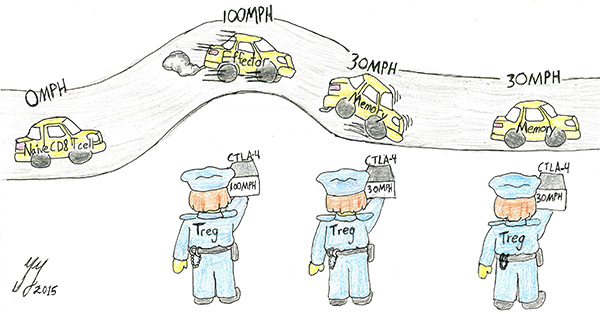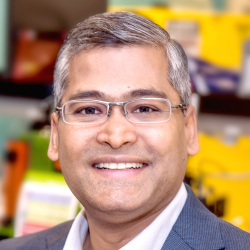Sarkar Lab

Regulatory T Cells police the immune system, making sure that killer T cells transition into a resting state after battling pathogens, but stay prepared to fight if the pathogen returns. Image: Surojit Sarkar, Vandana Kalia and Yevgeniy Yuzefpolskiy/Penn State University.
Helping Immune Cells Fight Cancer Relapse
The Ben Towne Center develops therapies that use reprogrammed immune cells to kill cancer cells. These immunotherapies have been remarkably effective in mice and are curing children in clinical trials. But what happens if the cancer comes back?
The Sarkar Lab is finding ways to help the immune system remember cancer and attack it if it relapses – whether that’s months or decades after a child goes into remission.
Investigating How Immune Cells Form Memories
When the body detects an illness or infection, it sends T cells to wipe out the enemy cells. Then a handful of these T cells transform into memory cells that remember the enemy and stand guard. This is the basic principal behind how vaccines create life-long immunity to viruses. We work closely with Dr. Vandana Kalia’s lab to study how this transformation occurs at a molecular and cellular level.
Our lab discovered that vitamin D, along with other inhibitory mediators, encourages the immune system to put the brakes on attacker cells and tell them to turn into memory cells. We are actively exploring ways to use vitamin D supplementation during immunotherapy to help patients create robust immune memory cells. We recently received a multiyear grant from the American Cancer Society to pursue this hypothesis.
We are also working with the Kalia Lab to study how a particular type of T cells – called regulatory T cells – instruct attacker cells to calm down, holster their weapons and become memory cells. This conversion of attacker T cells into a memory state enables them to use less energy and conserve resources so they can survive long-term and protect against future cancers and pathogens.
Our goal is to help create a new generation of immunotherapies that not only eliminate children’s cancer today, but also offer the promise of remission for their entire lives.
“We don’t want children to live in constant fear that their cancer may come back. We have miles to go, but we are optimistic our research will help ensure that the body has soldiers stationed to wipe out cancer long-term.”
Investigator Biography

Surojit Sarkar, PhD
Surojit Sarkar, PhD, is a principal investigator at the Ben Towne Center for Childhood Cancer and Blood Disorders Research at Seattle Children's Research Institute and an assistant professor at the University of Washington School of Medicine. He joined the Ben Towne Center in 2015 after more than 15 years of research experience in the field of T-cell immunity to pathogens, vaccines and cancer.
Sarkar received a PhD from the University of Pittsburgh in the field of vaccine immunology. He gained further expertise in T-cell immunology during a post-doctoral fellowship at the Emory Vaccine Center in Atlanta under the expert guidance of Dr. Rafi Ahmed, a member of the National Academy of Sciences and one of the pioneering leaders in the area of immunological memory.
Sarkar has published more than 25 research articles with upwards of 2,000 citations – some of his articles have been cited more than 300 times by other researchers. For a detailed list of Sarkar’s research contributions, please see his Google Scholar page.
Sarkar is actively recruiting post-doctoral fellows for his research program. For more information about the Sarkar Lab's research and career opportunities, please email Surojit Sarkar.
